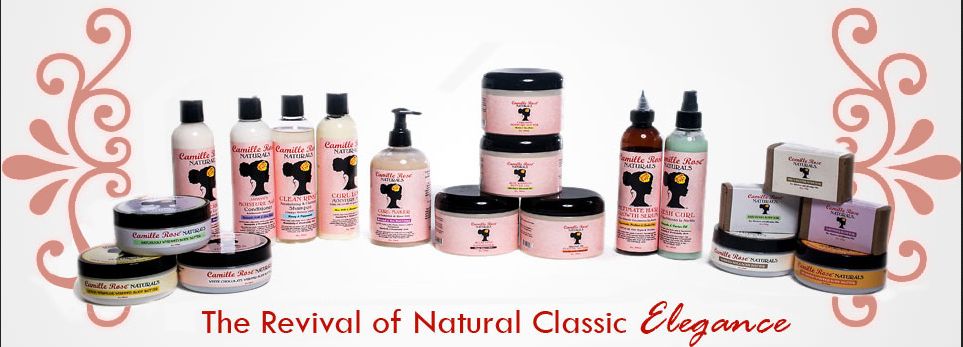Many natural hair beauties have noticed a problem concerning the quality and effectiveness of haircare product(s) from brands they used to adore.
I was watching a youtube video from “Kaice Alea” responding to twitter comments posted by a young lady who was asked to be a hair model at an expo featuring Carol’s Daughter products. The hair model at the expo was apparently shocked by the lack of diversity she saw. (Watch the video for screenshots of her twitter posts and pics of the expo)
Update: Since writing this article in 2017, SheaMoisture and it’s parent company, Sundial Brands, has since been sold to British-Dutch multinational Unilever. Carol’s Daughter was sold previously to L’Oreal.
At the expo, the hair model supposedly saw a “multicultural booth” were all the ad posters featured white or very light skinned women, and most of the representatives were white.
This is why it’s important to know who’s behind the products you’re buying and who’s making the decision on how they are marketed to the public. It also crucial to note how the formulas for those products are changing and why.
Let’s start with the truth: Many people who didn’t give a damn about black curly hair 10-15 years ago have either released their “me too” product line or are buying up popular (previously) black-owned companies to tap into those dollars.
Their objective is the bottom line. Period. And if they can save 3 cents a bottle by switching to a slightly more questionable lineup of ingredients, they will. If the teams of marketers think they can make 3 more cents a bottle by altering the formulas to cater to a “more diverse” clientele, they will.
As I was finishing up this post, Shea Moisture started trending on twitter concerning their use of white models to advertise their products. Some people’s knee-jerk reaction was to downplay the criticism being leveled against Shea Moisture by the very same black women who helped make Shea Moisture the powerhouse it is today was.
The problem with Shea Moisture is not simply an ad, like the proclamations from many know-nothing short-sighted people on social media claim. The problem is that black women have been complaining for years about the decreasing effectiveness of Shea Moisture products.
Sign up
Join the community to get access to all of the formulas and recipes right now!
If you love Shea Moisture and certain products continue to work well for you, by all means continue to use them if you want.
As for me, I only started to see the writing on the wall about 2 years ago. I noticed a change with the Coconut and Hibiscus Co-Wash Conditioning Cleanser. I used to love that product years ago. But last year (maybe more like 2 years ago, actually) I bought 2 more bottles because I couldn’t #DIY anything that worked as well as that cleanser used to. It was trash. It was nowhere near as effective as it used to be. It felt gummy and didn’t clean anywhere near as well as it used to clean.
Luckily, I’d save a photo of the ingredients from when I got my 1st bottle. Exactly as suspected, the ingredients list had changed. Later I found out the company who owns Shea Moisture, Sundial Brands, had taken on an “investment” from Bain Capital. Mitt Romney’s old stomping ground owns/owned an allegedly “large stake” in Shea Moisture. I tossed the bottles and moved on to something else.
That’s how it sometimes starts for companies who don’t outright sell to larger multinational corporations. Slowly, businesses which cater to a niche demographic — like naturally curly haired black women — become a target for takeover.
Sometimes, in my opinion, investments are made for the main purpose of that larger company learning everything about the smaller black-owned company and it’s demographic: how the brand is marketed, what ingredients are used for their products, how the product is used by the main demographic, who their suppliers are, etc. In the system of Capitalism, this is a feature, not a bug.
Suddenly, because the black-owned company has taken “investment” money, the creeps now have a say in how that company focuses on the bottom line. If the new investors or new owners say to change the formula to make it cheaper to produce, you HAVE to change the formula. If they say to change the formula so it works better for the hair type to which they want to market, you HAVE to change the formula.
Formulas will be changed because they now have a fiduciary responsibility to their shareholders/investors. If the shareholders can save 20 cents a bottle by switching to a less effective and cheaper conditioning ingredient, they’ll do it probably 99% of the time.
Larger companies would prefer to take over ownership of their competitors. However, I don’t think the larger companies are above using everything they’ve learned to set up competing brands which they own outright. Some of these larger companies may buy the suppliers of competitors which they couldn’t takeover, or put a hand full of mediocre clones on the market to shrink a competitor’s market share.
Get it Hot Then Take It “Mainstream”?
These people are money driven. If black women hadn’t shown them the enormous profit in (pretending?) to cater to natural hair customers, I believe they wouldn’t care at all about the black haircare market.
I think some companies use the black community to “design in” certain products. The term “design in” is used by salons (and beauty schools) where a manufacturer will have the stylists (future stylists) use a product on their clients in the salon (or at the school). If the product works well, the salons will sell bottles of the product directly to clients. After the product gets really popular, the manufacturers move the product to the grocery, pharmacy and big box stores.
But for this analogy, when I say “design in” I’m speaking about how manufacturers slap a photo of a naturally curly woman on the bottle, add a few drops of “key ingredients” we are more likely to respond to — like Shea butter, Black Castor oil or Baobab oil — and see how many black people buy it. They use black women to ‘make it hot’, so to speak. The product becomes worthy of coveting if it finds its way to the Hot Lists of magazines or becomes the topic of hundreds/thousands of reviews on youtube.
Once the product has great word of mouth and a stable/growing base of consumers, that’s when the pivot starts. That’s when the product or brand stops being “ours”. That’s when the marketing team and investors begin to insist that the formerly black-centered company should cater to a “more diverse” audience. Too often, that “more diverse” phrase translates into ‘we need to focus on the white and latina market’.
It’s as if larger companies relay to owners of black-owned haircare lines that if they want to stay profitable or build a company that lasts, they need to “diversify”. The unspoken rule is the company won’t be able to unlock larger shares of the market unless someone (probably white with power) is in some way involved with the production or management of the company.
Some black consumers go right along with that notion, as evidenced already by how many apparently black folk are on twitter caping for Shea Moisture. Maybe that’s because of their misplaced sense of morality? Maybe it’s because the very idea of only serving one segment of a population is inherently abhorrent to their sensibilities?
I personally think it’s an illogical and unnecessary response to an antiquated system which traditionally teaches black women that (1)complaining is futile, and (2) demanding preferential treatment for black women’s beauty issues is greedy. That system teaches that Black women are undeserving of continued and sustained attention. It teaches that the brand must pivot to a “larger audience” irrespective of the feelings of the audience which built that brands’ name.
Truthfully, the industry already naturally focuses on white women’s hair, skin and the issues specifically affecting them if only because white women make up the majority population. There’s more to it than that, but let’s leave it there for now.
Because of the history of this country and our role in it, brands like Shea Moisture have become a beacon; a signal that the company is… was… specifically designing products formulated to work well with extremely curly/coily/kinky hair.
However, the reality of the pivot to “more diverse” audiences is probably more insidious (dare I say) than that. Some larger companies seem to hunt for which products are becoming most popular among black women, and target the companies who manufacture those products in various ways.
They offer to take the brand to the ‘next level’ or promise to set up a brand which ‘stands the test of time’. The promise of greater fortune is always the bait used to turn great products into mediocre bottles of ‘blah’ in pursuit of the majority’s money.
As a business owner, honestly, how likely are you to turn down millions of dollars from a company who’s good at selling nonsensical fantasies like the one that says you can take their “investment” AND STILL have full control over business decisions in perpetuity? (*cough*Shea Moisture*cough*)
How likely are you to turn down millions of dollars after your market share decreases because larger companies already released a dozen mediocre clones of your product at cheaper prices? How likely are you to say no to a buyer promising to help you stay golden with your core demographic — a demographic constantly testing various products by various companies in search of the best one? (*cough*Carol’s Daughter*cough*)
Chasing mainstream dreams sometimes results in heartache. But black women are f_cking tired of not being seen as “mainstream”.
Who Owns What?
Another problem involves the hidden figures (see what I did there) behind what you think may be black-owned or black-operated companies simply because they seem to focus on curly hair. It’s important to know who’s calling the shots behind some of the bigger lines of products designed for curly hair.
No diss, but regardless of whether the “Curly Girl Method” works for you, it’s important to know that the founder and co-owner of Devacurl, for example, is a white woman with curly hair who grew up in England.
Regardless of how awesome that last bottle of Heat and Humidity Gel worked (and it really was outstanding), it’s important to know that the owner of Ouidad — who markets herself as the “Queen of Curl” at her website — is a Lebanese woman with wavy-looking hair.
Just because the Aveda product your department store stylist used on your hair was great, it’s important to know the founder was Horst Rechelbacher born in Austria. It’s important to know Rechelbacher went to India and was “introduced to” Ayurveda haircare and used that info to create a company which was later sold to Estee Lauder for hundreds of millions of dollars.
Know where your money is going. Walk into the transactional relationship between yourself and these brands with both eyes open, even if you love the product. They know you very well and they know how to get you to open your purse, so stop making assumptions about who is working to help you.
Ask yourselves whose curly hair are these companies catering to? Latinas have curly hair too. White women have curly hair too. It’s already a crapshoot whether a product designed specifically for 4C will work on all women who consider themselves 4C. Thus, you certainly need to understand how the products are formulated and who the company is targeting most.
In addition, you may get excluded from the equation all together if that company figured out how to cater to your biracial cousin, but not you. Your biracial brown-skinned cousin, to them, will mask the fact that they haven’t gotten around to you. Now that they’ve got a product that works well on your biracial counsin’s hair, the company is “diverse” now, so they don’t need to make products for your “grade” of natural hair.
Try to decipher which companies are fine with taking a ‘one size fits all’ approach to “curly haircare”, and which companies have a true understanding of the differences between Shontay’s 4b-4c tightly coiled mini-curls, Maria’s frizzy curls, and Mary Ellen’s slightly dry waves.
Know how your favorite brands originated and who will have preference if push comes to shove — in terms of who these companies will cater to and who they will ignore — once the brand becomes enticing (read: “profitable”) to larger companies.
It’s so important that you have a backup plan and not be solely satisfied with mass-produced products. Look for the smaller brands specifically designed to care for the type of hair found most on black women’s heads. And that’s ok. DON’T EVER let anybody make you feel bad about mainly patronizing companies owned by your own people when the majority ignores your needs. These smaller companies are out here and the number has only increased in recent years. But that isn’t enough.
I like trying new things. I do it all the time. But I think it’s starting to become more and more important to learn how to make at least some of your own products as a backup. That’s why curlytea.com exists. I got tired of the bullcrap, the high prices for mediocre products and the small amount of the industry that formulates products directly designed for a particular type of curly hair.
The current slogan of this place is “Empowering you to create your own haircare and skincare products”, and I mean that. You may not feel like taking over full control of every product you put on your hair (I don’t even do that), but you HAVE to have a backup plan for when a brand you love no longer seems to love you.
@curlyteaconsult
Related
blackgirllonghair.com/
ageistbeauty.com/
en.wikipedia.org/wiki/Curly_Girl_Method
ouidad.com/
en.wikipedia.org/wiki/Aveda




